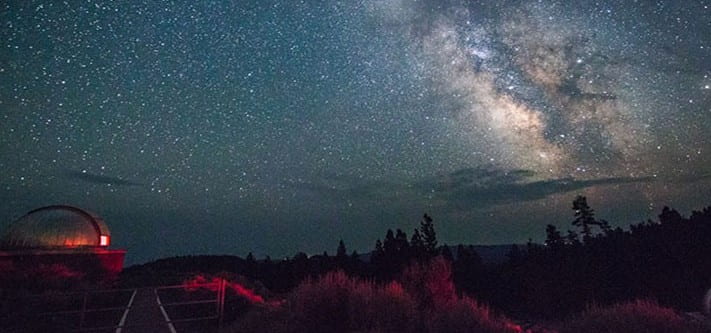The Institute for Fundamental Science (IFS) enhances the experimental, theoretical, and astronomy research activities at the University of Oregon. IFS is one of several centers and institutes supported by the Office of the Vice President for Research and Innovation, and maintains close relationships with the Department of Physics, the Department of Chemistry, the Department of Mathematics, and the Materials Science Institute.
The institute hosts visiting scientists, supports graduate and undergraduate student research, facilitates interaction between the experimental activities and theoretical investigations of IFS members, and fosters communication of research to the broader community.
IFS members have major involvement in international collaborations including the ATLAS and FASER Experiments at CERN, LIGO’s gravitational wave observatories, and others. We have vigorous programs of research in astronomy and astrophysics; condensed matter theory and statistical mechanics; data science; mathematics; particle theory; quantum information and quantum optics; and the International Linear Collider project.
Center Activities

Quantum Properties on a Human Scale: Nobel Prize in Physics 2025
The Nobel Prize in Physics 2025 was awarded jointly to John Clarke, Michel H. Devoret and John M. Martinis “for the discovery of macroscopic quantum mechanical tunnelling and energy quantisation in an electric circuit”
7 October 2025 || Source
The Nobel Prize laureates in physics for 2025, John Clarke, Michel H. Devoret and John M. Martinis, used a series of experiments to demonstrate that the bizarre properties of the quantum world can be made concrete in a system big enough to be held in the hand. Their superconducting electrical system could tunnel from one state to another,
...
IFS Seminar November 3: Matthew Citron (UC Davis)
Searching for millicharged particles at the LHC and beyond
Speaker: Matthew Citron (University of California Davis)
Date: Monday November 3, 2025
Time: 4:00 – 5:00 pm
Location: 472 Willamette Hall (IFS Seminar Room)
Abstract: Arising in hidden sector models of dark matter, millicharged particles could be produced copiously at facilities such as the LHC. However, due to their very small energy depositions, large detectors like CMS or ATLAS are blind to such particles. I will show how sensitivity can instead be achieved through the use of scintillator-based experiments that consist of
...
Particle or wave? Getting to the heart of quantum mechanics
Watch UO physicist–and IFS Director–Graham Kribs walk you through one of the seminal experiments that helped open the quantum age.
9 April 2025 || University Communications
Quantum mechanics is a branch of physics that attempts to explain the behavior of matter and energy at their smallest level, down to the size of subatomic particles like electrons, photons and quarks. And at that size, reality is very different from our everyday world.
The quantum world is distinct from the classical world familiar to us because particles in the quantum world exhibit both particle-like and
...